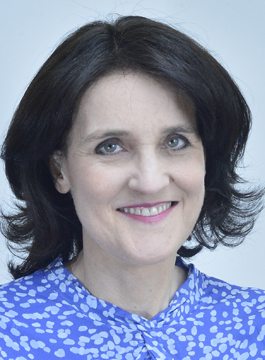The Rt Hon Dame Theresa Villiers DBE is a former barrister, academic, Secretary of State, MP and MEP.
In her 25 years in elected office, she served at the highest level of government in some of the most challenging jobs. She was a member of three governments under two Prime Ministers, holding portfolios including Environment, Food & Rural Affairs, Northern Ireland, Transport, and Treasury.
Theresa was appointed to David Cameron’s Shadow Cabinet in 2005, just seven months after being elected to the House of Commons, one of the fastest promotions ever. She was George Osborne’s deputy as Shadow Chief Secretary to the Treasury until 2007. In 2010, she became Minister of State for Transport in the Coalition Government, with strategic oversight of large complex projects such as Crossrail (the Elizabeth Line), the Thameslink upgrade, and delivery of the transport operation for the London 2012 Olympics.
Between 2012 and 2016, Theresa Villiers sat at the Cabinet table as Secretary of State for Northern Ireland, only the 35th woman ever appointed to the Cabinet. This role involved overseeing highly sensitive security and counter-terrorism matters. As one of the longest serving Northern Ireland Secretaries, she led lengthy and complex negotiation processes, including chairing two sets of protracted cross-party talks to avert twice the collapse of the devolved bodies under the Belfast Good Friday Agreement.
“Theresa Villiers spoke at the launch event for what has become the UK’s largest mass action campaign, The Great British Spring Clean. Theresa spoke with passion as we all know this is a subject she cares deeply about, she made the volunteers present feel valued and inspired and her words got the campaign off to a resounding start”
Keep Britain Tidy
She is adept at dealing with complex and volatile situations, conflict resolution and crisis management, having handled the response to multiple protests and crises in Northern Ireland. This included developing and implementing a strategy to address sensitive issues around flags and symbols, policing, and the legacy of The Troubles.
In 2019, Theresa was appointed Secretary of State for Environment, Food & Rural Affairs, leading the Brexit preparations on trade and border arrangements for food, covering delivery of multiple new statutory instruments, certification requirements, IT systems, databases, and inspection regimes. She was accountable for 27,000 staff and an £8.2 billion budget in that role. Protecting nature and the environment was an enduring goal of her time in Parliament. She presented three landmark new laws covering agriculture and fisheries, land management, and creating binding targets on nature recovery and other environmental issues.
From 2020 to 2024, Theresa Villiers was a member of the influential Intelligence and Security Committee, which oversaw the intelligence agencies and produced reports using highly classified information on issues such as China.
Over the years, she gained extensive policymaking expertise, leading technical legislative and scrutiny processes, including in financial market laws like MIFID.</span> In 2021, she served as one of three members of the Taskforce on Innovation, Growth and Regulatory Reform, making recommendations on modernising regulation in areas such as GDPR, financial services, clinical trials, and health technology.
Theresa Villiers is firmly committed to diversity and inclusion. In her former role as MP, she advocated on behalf of diverse communities, ensuring their concerns were heard in Parliament. That includes making powerful contributions to the historic Parliamentary debates on antisemitism.
Rt. Hon. Dame Theresa Villiers Speaking topics:
Politics and Geopolitics:
The current state of politics in the UK: the rise of Reform and its impact on Labour and the Conservatives. Public engagement in the democratic process; a changing media landscape in politics – the effect of social media on elections and political discourse; assessing the state of support for the UK partnership of nations; UK relationships with China and India; a changing security landscape in Europe; Israel and the conflict in the Middle East.
How Government Works:
How do you get Whitehall to listen to your point of view? Tips for connecting with civil servants and Ministers, putting points across effectively to them, building coalitions to influence government, mobilising the public to talk to their MP about their concerns, and navigating who does what in the various devolution settlements. How the government approaches big infrastructure projects.
Sustainability, the Environment, and Nature Conservation:
A popular environment and sustainability speaker, Theresa discusses the two intertwined challenges of climate change and the destruction of natural habitats. Retaining public support for net-zero policies. Strong public attachment to natural landscapes and wildlife. Harnessing consumer choice as a means to achieve environmental goals. Involving children and young people. Reconciling green goals with economic development, raising living standards, and delivering returns for shareholders. Ocean conservation and the massive impact of Blue Planet in changing public attitudes. Tackling waste and boosting recycling is the less glamorous aspect of climate change and conservation debates, but it is crucially important.
Women in Politics and Peace-Building:
Continued under-representation of women in politics. Hostility and security risks women face in elected office, and how these are dealt with. The work done by Conservatives to boost the number of women MPs – Theresa was one of just 18 when she was elected in 2005.
The role of women in Northern Ireland peace-building efforts. Theresa’s experience in Northern Ireland was working to maintain the peace created by the 1998 Belfast Good Friday Agreement. Cross-party talks processes. Engaging with the broader community. Women’s involvement in building a shared society in Northern Ireland and tackling sectarian divisions.
Diversity in Leadership: Connecting with Minority Groups:
Representing a highly multi-ethnic, multicultural constituency. Successful engagement with minority communities. Changing voting patterns amongst ethnic minorities. How diaspora groups in the UK can provide a bridge for international trade with countries such as India. Entrepreneurial culture in minority communities.

